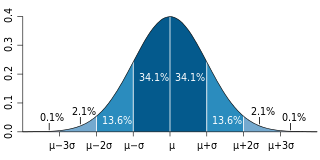
Free will is the notional capacity or ability to choose between different possible courses of action unimpeded.

Determinism is the philosophical view that all events in the universe, including human decisions and actions, are causally inevitable. Deterministic theories throughout the history of philosophy have developed from diverse and sometimes overlapping motives and considerations. Like eternalism, determinism focuses on particular events rather than the future as a concept. The opposite of determinism is indeterminism, or the view that events are not deterministically caused but rather occur due to chance. Determinism is often contrasted with free will, although some philosophers claim that the two are compatible.

In ancient Greek religion and mythology, the Moirai often known in English as the Fates—were the personifications of destiny. They were three sisters: Clotho, Lachesis, and Atropos. Their Roman equivalent is the Parcae.

Predestination is a doctrine in Calvinism dealing with the question of the control that God exercises over the world. In the words of the Westminster Confession of Faith, God "freely and unchangeably ordained whatsoever comes to pass." The second use of the word "predestination" applies this to salvation, and refers to the belief that God appointed the eternal destiny of some to salvation by grace, while leaving the remainder to receive eternal damnation for all their sins, even their original sin. The former is called "unconditional election", and the latter "reprobation". In Calvinism, some people are predestined and effectually called in due time to faith by God, all others are reprobated.

Wyrd is a concept in Anglo-Saxon culture roughly corresponding to fate or personal destiny. The word is ancestral to Modern English weird, whose meaning has drifted towards an adjectival use with a more general sense of "supernatural" or "uncanny", or simply "unexpected".

Luck is the phenomenon and belief that defines the experience of improbable events, especially improbably positive or negative ones. The naturalistic interpretation is that positive and negative events may happen at any time, both due to random and non-random natural and artificial processes, and that even improbable events can happen by random chance. In this view, the epithet "lucky" or "unlucky" is a descriptive label that refers to an event's positivity, negativity, or improbability.
Fatalism is a family of related philosophical doctrines that stress the subjugation of all events or actions to fate or destiny, and is commonly associated with the consequent attitude of resignation in the face of future events which are thought to be inevitable.

In ancient Greek religion, Ananke, from the common noun ἀνάγκη, is the Orphic personification of inevitability, compulsion and necessity. She is customarily depicted as holding a spindle. One of the Greek primordial deities, the births of Ananke and her brother and consort, Chronos, were thought to mark the division between the eon of Chaos and the beginning of the cosmos. Ananke is considered the most powerful dictator of fate and circumstance. Mortals and gods alike respected her power and paid her homage. Sometimes considered the mother of the Fates, she is thought to be the only being to influence their decisions. According to Daniel Schowalter and Steven Friesen, she and the Fates "are all sufficiently tied to early Greek mythology to make their Greek origins likely."

Eternal return is a philosophical concept of predeterminism which hypothesizes that all events in the world repeat themselves in the same sequence through an eternal series of cycles.
Predeterminism is the philosophy that all events of history, past, present and future, have been already decided or are already known, including human actions.
Fate most commonly refers to destiny, a predetermined course of events.
Theological determinism is a form of predeterminism which states that all events that happen are pre-ordained, and/or predestined to happen, by one or more divine beings, or that they are destined to occur given the divine beings' omniscience. Theological determinism exists in a number of religions, including Jainism, Judaism, Christianity, and Islam. It is also supported by proponents of Classical pantheism such as the Stoics and by philosophers such as Baruch Spinoza.
Qadar is the concept of divine destiny in Islam. As God is all-knowing and all-powerful, everything that has happened and will happen in the universe is already known. At the same time, human beings are responsible for their actions, and will be rewarded or punished accordingly on Judgement Day.
Amor fati is a Latin phrase that may be translated as "love of fate" or "love of one's fate". It is used to describe an attitude in which one sees everything that happens in one's life, including suffering and loss, as good or, at the very least, necessary.

The Fates are a common motif in European polytheism, most frequently represented as a trio of goddesses. The Fates shape the destiny of each human, often expressed in textile metaphors such as spinning fibers into yarn, or weaving threads on a loom. The trio are generally conceived of as sisters and are often given the names Clotho, Lachesis, and Atropos, which are the names of the Moirai, the version of the Fates who appear in Greek mythology. These divine figures are often artistically depicted as beautiful maidens with consideration to their serious responsibility: the life of mortals. Poets, on the other hand, typically express the Fates as ugly and unwavering, representing the gravity of their role within the mythological and human worlds.
The 19th-century philosopher Friedrich Nietzsche is known as a critic of Judeo-Christian morality and religions in general. One of the arguments he raised against the truthfulness of these doctrines is that they are based upon the concept of free will, which, in his opinion, does not exist.

Stoic physics refers to the natural philosophy of the Stoic philosophers of ancient Greece and Rome which they used to explain the natural processes at work in the universe.
Free will in antiquity is a philosophical and theological concept. Free will in antiquity was not discussed in the same terms as used in the modern free will debates, but historians of the problem have speculated who exactly was first to take positions as determinist, libertarian, and compatibilist in antiquity. There is wide agreement that these views were essentially fully formed over 2000 years ago. Candidates for the first thinkers to form these views, as well as the idea of a non-physical "agent-causal" libertarianism, include Democritus, Aristotle, Epicurus, Chrysippus, and Carneades.
Heimarmene or Himarmene is a goddess and being of fate/destiny in Greek mythology. She belongs to a family of similar beings of destiny and fate, which have given us various modern concepts.
Pepromene is a goddess and being of fate/destiny in Greek mythology. The ancient perception of her being gives the name as belonging within other Greek ideas for destiny and fate.










